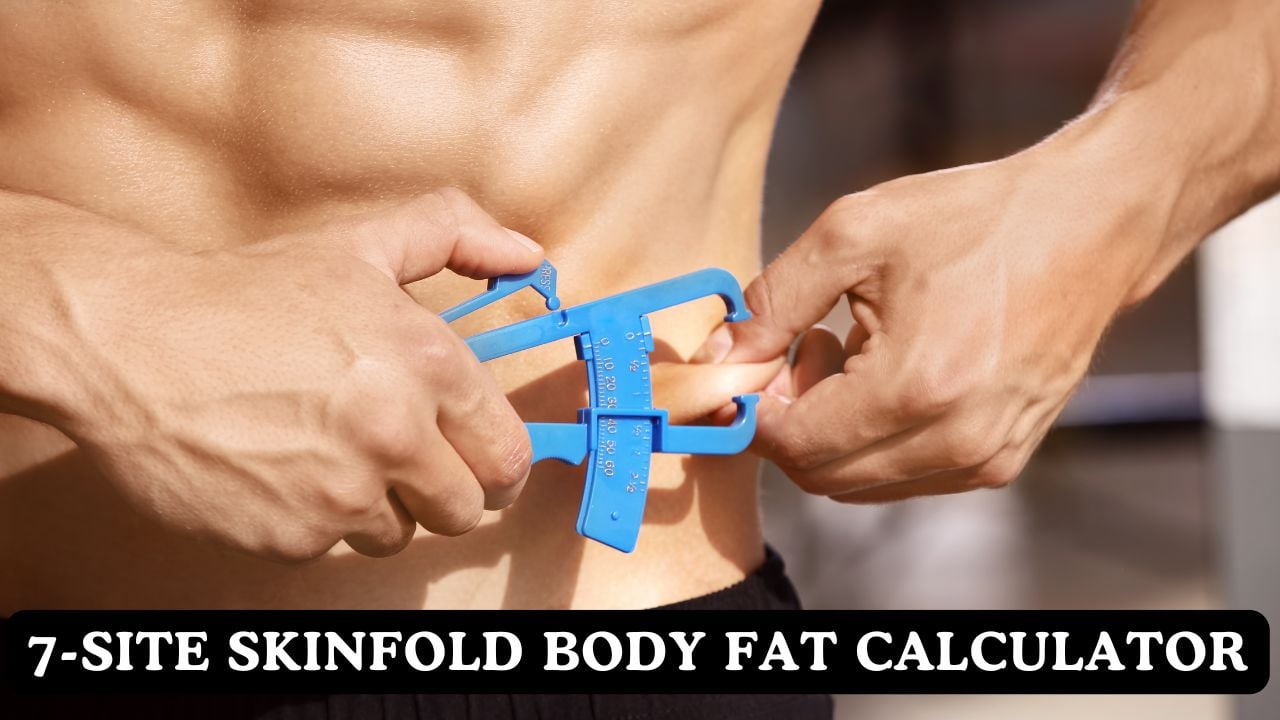7-Site Skinfold Body Fat Calculator
Advanced Jackson Pollock method for precise body composition assessment using professional skinfold measurements

7-Site Jackson Pollock Skinfold Body Fat %
Body fat percentage provides a more accurate assessment of your fitness level than weight alone. Understanding your body composition helps you track progress during weight loss, muscle building, or athletic training. The Jackson Pollock 7-site method is considered the gold standard for skinfold measurements, offering professional-level accuracy for fitness enthusiasts and health professionals. For visual reference guides that complement your measurements, visit our comprehensive Body Fat Percentage Chart on Fit Life.
🔬 Scientific Validation
The Jackson Pollock 7-site method was developed through extensive research involving over 300 men and women across different age groups and body types. Research studies demonstrate its superior accuracy compared to 3-site methods, with correlation coefficients exceeding 0.90 when compared to hydrostatic weighing. The method combines seven anatomical sites with age and gender-specific equations to provide the most comprehensive skinfold assessment available.
📏 Professional Equipment Requirements
Accurate measurements require quality skinfold calipers with consistent spring tension. Professional-grade calipers like Lange, Harpenden, or Accu-Measure provide the reliability needed for precise readings. The Jackson Pollock method assumes measurements are taken with calibrated equipment applying 10g/mm² pressure consistently. For best results, have measurements taken by a trained professional or follow standardized protocols carefully.
Complete Measurement Guide
🫀 Chest Skinfold Technique
Location: Diagonal fold between nipple and anterior axillary fold
Method: Pinch skin midway between nipple and armpit, following natural skin line
Direction: Diagonal fold running toward armpit
Common Errors: Measuring too close to nipple or armpit, not following skin’s natural angle
🫁 Axilla (Midaxillary) Technique
Location: Vertical fold on midaxillary line at xiphoid process level (bottom of sternum)
Method: Pinch skin on side of torso, level with bottom of sternum
Direction: Vertical fold parallel to body axis
Common Errors: Measuring too high or low, angling the fold instead of keeping it vertical
💪 Triceps Skinfold Technique
Location: Vertical fold on posterior arm, midway between acromion and olecranon
Method: Measure over triceps muscle belly with arm relaxed at side
Direction: Vertical fold parallel to arm axis
Common Errors: Measuring while arm is flexed, incorrect midpoint identification
🔙 Subscapular Skinfold Technique
Location: Diagonal fold below inferior angle of scapula
Method: Follow natural skin line, approximately 45° to horizontal
Direction: Diagonal fold running medially downward
Common Errors: Measuring directly on the scapula bone, wrong angle
🫃 Abdomen Skinfold Technique
Location: Vertical fold 2cm lateral to umbilicus
Method: Pinch skin beside navel, avoid muscle contraction
Direction: Vertical fold parallel to body midline
Common Errors: Measuring directly over navel, including muscle tissue
🦴 Suprailiac Skinfold Technique
Location: Diagonal fold above iliac crest at anterior axillary line
Method: Follow natural skin line above hip bone
Direction: Diagonal fold following skin contour
Common Errors: Measuring too far forward or back, wrong angle
🦵 Thigh Skinfold Technique
Location: Vertical fold on anterior thigh, midway between inguinal crease and patella
Method: Measure with subject standing, weight on opposite leg
Direction: Vertical fold parallel to thigh axis
Common Errors: Measuring while weight is on measured leg, incorrect midpoint
Jackson Pollock Method Details
Pre-Measurement Preparation
- Ensure subject is well-hydrated but not immediately post-exercise
- Room temperature should be comfortable (20-24°C)
- Subject should be in minimal, form-fitting clothing
- Mark all measurement sites before beginning
- Calibrate calipers according to manufacturer specifications
Measurement Technique
- Take measurements on the right side of the body only
- Pinch skin firmly between thumb and forefinger
- Place caliper jaws 1cm below fingers, perpendicular to fold
- Read measurement 2 seconds after full pressure is applied
- Take 2-3 measurements at each site, use median value
- Rotate through sites rather than completing one site at a time
Step 1: Sum All Seven Measurements
Add chest + midaxillary + triceps + subscapular + abdomen + suprailiac + thigh measurements (in millimeters)
Step 2: Calculate Body Density
Men (Jackson & Pollock, 1978):
BD = 1.112 - (0.00043499 × Σ) + (0.00000055 × Σ²) - (0.00028826 × Age)
Women (Jackson, Pollock & Ward, 1980):
BD = 1.097 - (0.00046971 × Σ) + (0.00000056 × Σ²) - (0.00012828 × Age)
Step 3: Convert to Body Fat %
Body Fat % = ((4.95 ÷ Body Density) - 4.50) × 100
Using the Siri equation (1961)
Body Fat Standards & Health Ranges
| Category | Men (18-29) | Men (30-49) | Men (50+) | Women (18-29) | Women (30-49) | Women (50+) |
|---|---|---|---|---|---|---|
| Essential Fat | 3-5% | 3-5% | 3-5% | 10-13% | 10-13% | 10-13% |
| Athletes | 6-13% | 7-16% | 9-18% | 14-20% | 16-23% | 18-27% |
| Fitness | 14-17% | 17-19% | 19-21% | 21-24% | 24-27% | 27-30% |
| Average | 18-24% | 21-27% | 24-29% | 25-31% | 28-34% | 31-37% |
| Above Average | 25%+ | 28%+ | 30%+ | 32%+ | 35%+ | 38%+ |
Important: These ranges are general guidelines. Individual variation exists due to genetics, ethnicity, and training status. Athletes in certain sports may have body fat percentages outside these ranges while maintaining excellent health. For comprehensive visual guides and additional context, explore our Visual Body Fat Percentage resource on Fit Life.
Accuracy & Validation Research
Original Jackson & Pollock Research (1978-1980)
The foundational research by Jackson and Pollock established the 7-site method as the gold standard for skinfold body fat assessment. Their studies involved over 300 men and women aged 18-61 years, primarily from Caucasian populations, establishing separate equations for each gender. Validation studies consistently show correlation coefficients of 0.85-0.95 when compared to hydrostatic weighing, with standard errors of estimate ranging from 2.5-3.5% within the validation population.
Comparative Method Analysis
Comprehensive reviews of body composition methods consistently rank the Jackson Pollock 7-site method among the most accurate field techniques available. While DEXA and BodPod offer higher precision, the 7-site method provides excellent accuracy at a fraction of the cost, making it ideal for fitness professionals, researchers, and serious fitness enthusiasts tracking long-term progress.
Practical Application Studies
Real-world validation demonstrates that trained exercise science students can achieve reliable measurements with proper instruction. The method’s robustness makes it suitable for various populations including athletes, clinical patients, and general fitness enthusiasts. Consistency in measurement technique is more important than absolute precision for tracking changes over time.
Professional Tips for Best Results
Measurement Consistency
Take measurements at the same time of day, preferably morning after bathroom use but before eating. Hydration status affects skin thickness, so maintain similar hydration levels between sessions.
Equipment Calibration
Verify caliper accuracy using calibration blocks or by measuring known thickness materials. Replace calipers showing inconsistent readings or damaged spring mechanisms.
Trained Measurer
Have the same person take measurements when possible. If self-measuring, practice extensively and consider having someone verify your technique for critical sites.
Progress Tracking
Focus on trends rather than single measurements. Body fat changes slowly, so monthly measurements provide better insight than weekly tracking. Document all conditions for consistency.
Health & Fitness Applications
🏋️ Athletic Performance Monitoring
Professional athletes and coaches use 7-site measurements to optimize body composition for specific sports. Endurance athletes typically maintain lower body fat for improved power-to-weight ratios, while strength athletes may carry higher percentages while maintaining performance. Regular monitoring helps identify optimal competition weight and guides nutrition periodization strategies.
🎯 Weight Management Goals
Unlike scale weight, body fat percentage distinguishes between fat loss and muscle loss during caloric restriction. This precision helps individuals maintain lean muscle mass while reducing fat stores. The Jackson Pollock method provides the accuracy needed to detect meaningful changes in body composition over time, supporting evidence-based adjustments to diet and exercise programs.
🏥 Clinical Health Assessment
Healthcare professionals use body fat measurements to assess health risks associated with excess adiposity. While BMI provides population-level insights, body fat percentage offers individual-specific information about disease risk. The 7-site method’s accuracy makes it valuable for monitoring patients with metabolic conditions, eating disorders, or those undergoing medical weight management.
⚕️ Medical Disclaimer
This 7-site skinfold calculator provides estimates based on scientifically validated Jackson Pollock equations and should not replace professional medical advice. Individual body fat distribution, muscle mass, bone density, and other factors can influence accuracy. Results may vary based on measurement technique, equipment quality, and individual physiological characteristics. The calculator is designed for healthy adults aged 18-61 years (the validation range of the original Jackson-Pollock research). The equations were primarily validated on Caucasian populations and accuracy may decrease when applied to other ethnic groups. Consult with healthcare professionals, registered dietitians, or certified fitness professionals before making significant changes to diet, exercise, or lifestyle based on these measurements. Pregnant or breastfeeding women, individuals with eating disorders, or those with medical conditions affecting body composition should seek professional guidance before using these results for health or fitness planning.
Reference
- Kuo FC, Lu CH, Wu LW, Kao TW, Su SC, Liu JS, Chen KC, Chang CH, Kuo CC, Lee CH, Hsieh CH. Comparison of 7-site skinfold measurement and dual-energy X-ray absorptiometry for estimating body fat percentage and regional adiposity in Taiwanese diabetic patients. PLoS One. 2020 Jul 24;15(7):e0236323. doi: 10.1371/journal.pone.0236323. PMID: 32706814; PMCID: PMC7380604.
- Elsey AM, Lowe AK, Cornell AN, Whitehead PN, Conners RT. Comparison of the Three-Site and Seven-Site Measurements in Female Collegiate Athletes Using BodyMetrix™. Int J Exerc Sci. 2021 Apr 1;14(4):230-238. doi: 10.70252/MBCK9241. PMID: 34055165; PMCID: PMC8136548.
- Barreira, Tiago & Renfrow, Matthew & Tseh, Wayland & Kang, Minsoo. (2013). The Validity Of 7-Site Skinfold Measurements Taken By Exercise Science Students. International Journal of Exercise Science. 6. 20-28. 10.70252/IFBG2740.

Manish is a NASM-certified fitness and nutrition coach with over 10 years of experience in weight lifting and fat loss fitness coaching. He specializes in gym-based training and has a lot of knowledge about exercise, lifting technique, biomechanics, and more.
Through “Fit Life Regime,” he generously shares the insights he’s gained over a decade in the field. His goal is to equip others with the knowledge to start their own fitness journey.
